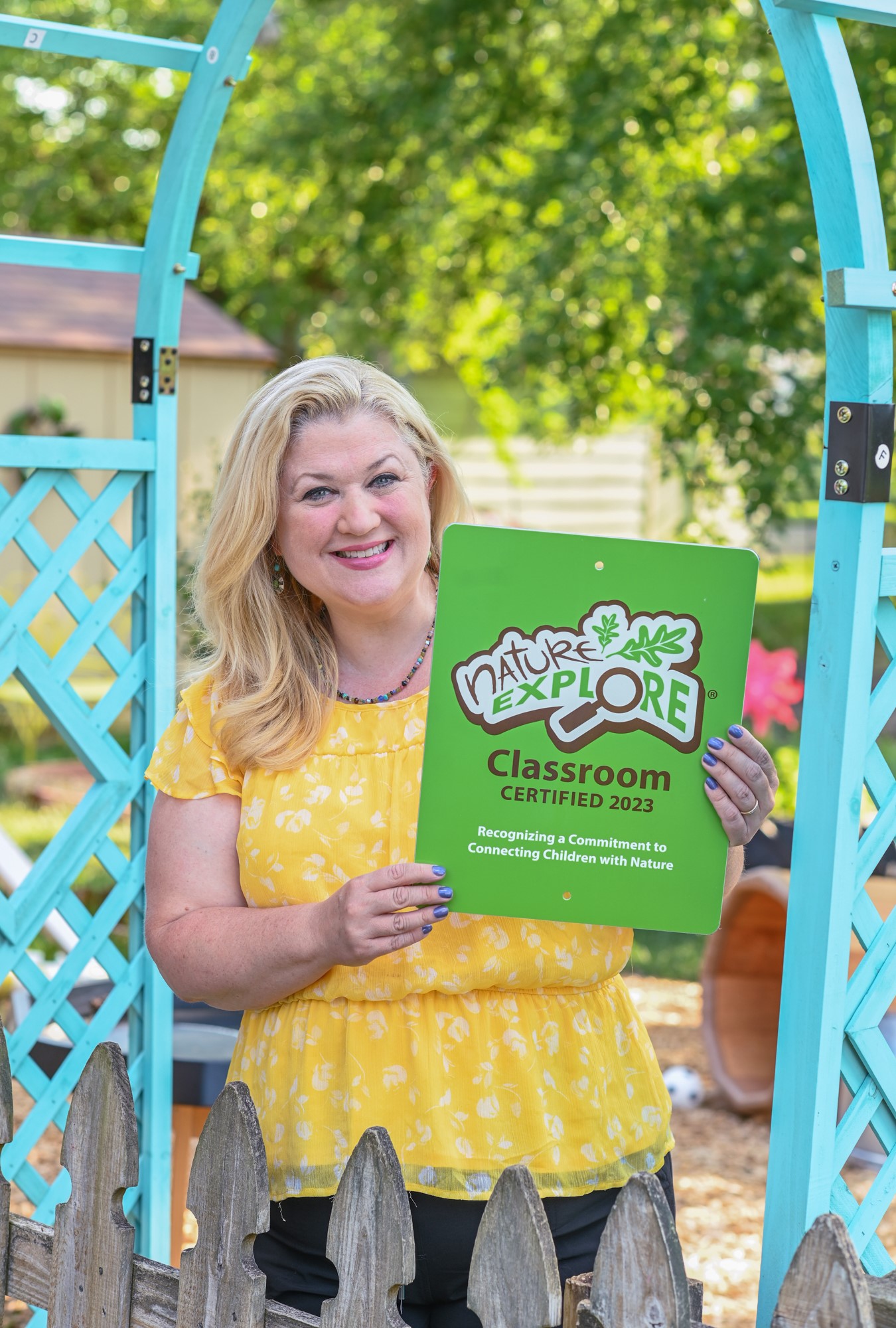Matchmaking childcare providers and farmers: building connections for healthier futures
Using local foods, gardening and hands-on food activities helps improve the quality of early childhood environments.

About four miles west of the hustle and bustle of Michigan’s State Capitol, you’ll find a magical place. Young children play under the canopy of a snap green bean trellis tent and cook in a mud kitchen, colorful flowers bloom from upcycled boots and children sort seeds and paint with colors made from vegetable scraps harvested from the on-site garden. These are scenes from Mimi’s House Family Childcare, a licensed family childcare home owned and operated by Mary Turner, who cares for a small group of children between the ages of zero to three. Turner calls it her “dream” to work with youngsters and attributes her childhood experiences as a factor in her desire to provide a supportive environment for children to learn and grow.
For the last year, Turner has been among the over 70 Michigan-based family childcare providers who have been participating in an MSU Extension-led research project called Growing Healthy Eaters. Growing Healthy Eaters is a farm to early care and education (ECE) initiative with a goal of increasing fruit and vegetable consumption among young children, supporting professional development for early childcare providers, while building relationships between local Michigan farmers and childcare providers.
Farm to ECE initiatives include at least one of three core elements: local food purchasing, gardening, and food and agricultural activities. MSU Extension facilitates farm to ECE initiatives to support young children’s connections to fresh local food and to improve their engagement with local agriculture. These core elements have been shown to increase children’s willingness to try new produce items, and increase the consumption of fruits and vegetables which can support overall improvement in diet quality. At Mimi’s House Family Childcare, Turner incorporates all core elements and invites children to participate in food preparation, indoor and outdoor edible gardening, and she purchases seasonal and local food to integrate into the meals and snacks served to children in her care.

As a childcare provider, Turner understands how these activities align with learning and development goals and how they contribute to the overall quality of the learning environment she provides. Turner’s passion has not gone unrecognized. Mimi’s House Family Childcare has received the highest rating possible for “Demonstrating Quality,” from the Great Start to Quality, and been identified as a Certified Nature Explorer Classroom. In addition, Mimi’s House Family Childcare recently received a Grow More Award for demonstrating a commitment to gardening, nutrition and agriculture education from the Michigan Farm to Early Care Education Network.

Recruited providers like Turner were connected to resources that support her efforts to implement farm to ECE practices. “I was doing some of these things on a smaller scale, participating in Growing Healthy Eaters helped me expand and elevate my goals.” One of the resources was a local MSU Extension Community Nutrition Instructor, Shelley Frazier, who coached Turner through a process that led to increases in best practices aligned with early childhood nutrition and farm to ECE practices. For example, she was able to expand the space and volume of food she grew in her outdoor garden beds, growing enough not only to supplement meals and snacks, but also to go home with family members.
Through Growing Healthy Eaters, Turner was also matched with Mark Kastner, a four-season farmer and owner of Hillcrest Farms, whom she met weekly at her local farmers market where she’d go to pick up a subsidized seasonal produce box. “The vegetables were so beautiful, I’d photograph them when I returned home,” recalled Turner. “He [Mark] would call me by my name, we’d swap stories, and I’d share with him how I was going to prepare the produce with the kids.”
Mark Kastner has been farming since 2010 on land he and his wife own in Eaton Rapids. Hillcrest Farms proudly grows and markets fresh produce throughout the year. Kastner attributes one of the reasons for his start in agriculture to observations he made between nutrition and physical health and performance when his two children were active in hockey and figure skating. When approached by MSU Extension to participate in Growing Healthy Eaters, Kastner admits he was cautiously optimistic. “Mary seemed to really appreciate fresh lettuce in February. She was easy to talk to and always showed up on time. I could tell that it was important to her to make the effort to come pick the food up.”

Kastner thinks his belief in nutrition, or his “guiding light” as he referred to it, paired with his desire to meaningfully impact young eaters, contributes to his interest in selling his produce to markets such as childcare settings and K-12 schools. In addition to being a worthwhile contribution to the health of a community, Kastner notes early childhood settings can be good for business without requiring too much advance harvest planning. “There’s value in growing for childcare settings, they can be a reliable market and contribute to the diversity of your income streams. With Mary, I didn’t have to plan for anything extra because she has a small operation.”
Mary Turner plans to keep purchasing produce from Mark at Hillcrest Farms with the support of a federal child nutrition program. The Child and Adult Care Food Program (CACFP) helps to reimburse nutritious meals and snacks, including locally grown food. CACFP can also help offset the costs of edible gardening supplies if the produce grown in the garden is used as part of a reimbursable meal or for nutrition education.
Preliminary results of Growing Healthy Eaters research conducted by MSU Extension are encouraging. Participating childcare providers showed improvement in meeting farm to ECE best practices in their childcare family homes. These practices and improvements include:
- Serving a greater variety and larger amount of locally grown fruits and vegetables. Specifically, an increase in dark green, red or orange vegetables, and legumes was seen with a sizable increase in providers serving vegetables at breakfast and snack time. Not a focus of the research but also noted was an increase in whole grains and a decrease in pre-fried foods served.
- Gardening as an activity to learn about food.
- Using food from a garden in meals and snacks.
- Participating childcare providers reporting an increase in knowledge in purchasing, preparing, serving, and planning meals with local or seasonal produce.
Mary Turner recently marked her 20th year as a childcare provider. When it comes to farm to ECE initiatives she encourages her peers to be open to learning. “Start small, include the children in the process and go from there. Be ok with minor setbacks like if a new recipe flops or dealing with a dead plant…it’s part of the learning and adventure.”
Several resources exist on Farm to Early Care and Education. Here are a few:
The Michigan Farm to ECE Network
Michigan State University Center for Regional Food Systems
Association of State Public Health Nutritionists Farm to Early Care and Education Initiatives
Growing Healthy Eaters research was supported by the U.S. Department of Agriculture Supplemental Nutrition Assistance Program Education (SNAP-Ed) and a grant from the Allen Foundation, Inc.
MSU Extension partners with the Michigan Department of Health and Human Services to provide SNAP-Ed throughout Michigan. SNAP-Ed focuses on good nutrition, stretching food dollars, living physically active lifestyles and engaging partners to build healthier communities. MSU Extension continues to offer local coaching in support of healthier childcare environments, including farm to early care and education. Find examples of two video success stories below.
Grandma’s School Daycare in Flint, Michigan
Reading Rainbow Childcare and the Tiki Hut Farm Market in Lake County, Michigan



 Print
Print Email
Email
